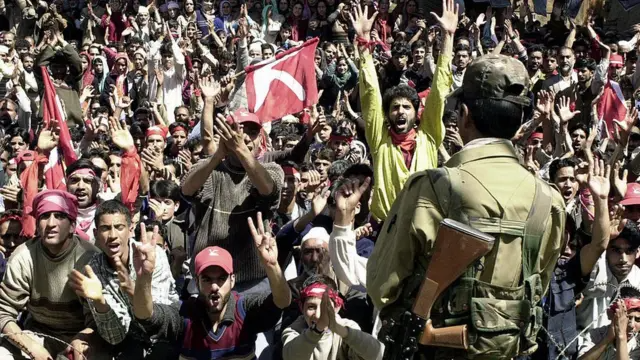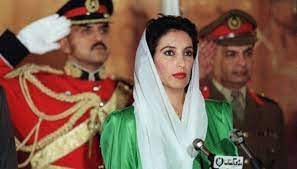

When and why did the observance of Kashmir Solidarity Day on February 5th begin? The story behind it is quite interesting. Generally, nationally observed days have a historical significance, but February 5th is one such day that is commemorated nationwide without having any specific historical reference or importance. In February 1989, as the Soviet Union began its withdrawal from Afghanistan, a strange and intense realization gripped young activists involved in freedom movements across the world. They started believing that, like the Afghans, they too could launch armed resistance for their independence and emerge victorious. Kashmiri youth assumed that just as the West had supported the Afghans, they would also stand by them because Kashmir was a disputed and unresolved issue under United Nations resolutions. Some of these young men had secretly participated in the Afghan Jihad and had established connections with Afghan commanders.
In political movements, some moments can turn an entire population or public opinion in their favor. A similar moment came on December 8, 1989, when India's Home Minister, Mufti Mohammad Sayeed's 23-year-old daughter, Rubaiya Sayeed, was kidnapped from Srinagar. The alleged kidnappers, affiliated with the Jammu and Kashmir Liberation Front (JKLF), which advocated for an independent state, demanded the release of five of their detained comrades in exchange for Rubaiya Sayeed, a medical college student. After five days of negotiations, the government finally accepted the kidnappers' demands. When the released militants reappeared in Srinagar, celebrations erupted across Indian-administered Kashmir. The entire region rejoiced.

For the first time, Kashmiri youth achieved a significant victory against the Indian government. Many Indian analysts described it as the first victory of the separatists. During this time, young militants from Indian-administered Kashmir secretly crossed the border into Pakistan-administered Kashmir. These young men would travel through dense forests during the day, hiding from authorities, and head westward as the sunset. By dawn, they would enter Pakistan-administered Kashmir, where local citizens would look at them in awe and astonishment. One day, a crowd of young Kashmiris gathered in an old Jamaat-e-Islami building made of deodar wood and stone on Eidgah Road in Muzaffarabad. At that time, I was a student at Karachi University. When news of the arrival of these young Kashmiris spread, I bought a train ticket and traveled to Muzaffarabad to see for myself who these individuals were, who had arrived with the determination to confront a massive war machine. The unkempt beards, exhausted eyes, dark circles from sleepless nights, and often their determined tones are still fresh in my memory.
In the courtyard of this building, locals had gathered ration and were cooking rice and meat over an open fire for the young men. At that time, the Amir of Jamaat-e-Islami, Qazi Hussain Ahmad, who had been active in the 'Jihad' against Russia in Afghanistan and had strong ties with Afghan Mujahideen groups, turned his attention towards the Kashmiris. He visited Muzaffarabad and met with these young Kashmiris, whom he often referred to as "Mujahideen," along with the local Amir of Jamaat-e-Islami, Abdul Rashid Turabi. Qazi Hussain Ahmad then requested the Chief Minister of Punjab, Nawaz Sharif, to arrange housing and food for these young men. A hostel at Rawalpindi Medical College on Murree Road was vacated overnight, and this four-story building became their first residence.
Qazi Hussain Ahmad appealed to Pakistanis to observe a nationwide strike on February 5th as a show of solidarity with the Kashmiris. His ally and the president of Islami Jamhoori Ittehad (IJI), commonly known as IJI, Punjab Chief Minister Muhammad Nawaz Sharif, also endorsed the strike and declared a public holiday in Punjab. At that time, IJI and opposition parties would relentlessly accuse Benazir Bhutto of being anti-Kashmir and pro-India.

When Benazir Bhutto assumed the office of Prime Minister for the first time on December 2, 1988, the fourth SAARC conference was scheduled to take place in Islamabad just four weeks later. Both Benazir Bhutto and Indian Prime Minister Rajiv Gandhi sought to open a new chapter in relations between the two countries. Prime Minister Rajiv Gandhi visited Islamabad to attend the SAARC conference. He was the second Indian Prime Minister to visit Pakistan after his grandfather, Pandit Jawaharlal Nehru. The opposition accused Benazir Bhutto of ordering the removal of signboards from Kashmir House, located just a few furlongs from Islamabad’s Marriott Hotel so that their presence would not offend Rajiv Gandhi. However, the Capital Development Authority insisted that the boards had been removed for cleaning. On December 31, the two Prime Ministers held a joint press conference where Rajiv Gandhi, responding to a question, stated, "There is no question of a referendum on Kashmir anymore. Kashmiris have already decided their future through elections." It is said that Benazir Bhutto remained silent on this response because she knew that during their meetings, the Indian Prime Minister had outright refused to discuss Kashmir. She wanted to maintain the spirit and atmosphere of reconciliation. After this, the opposition found yet another opportunity to criticize Benazir Bhutto and label her as "pro-India." Government-opposing magazines and journals published articles, columns, and commentaries harshly criticizing Prime Minister Benazir Bhutto, accusing her of having "sold Kashmir."
Against this backdrop, when Prime Minister Benazir Bhutto saw that opposition parties were calling for a nationwide strike on February 5, she decided to join in as well. Not only did she announce a nationwide strike and a public holiday, but she also addressed a public gathering in Muzaffarabad, declaring, "We will turn Jagmohan (the Governor of Indian-administered Kashmir) into 'Bhag Mohan' (one who flees)." During her passionate speech, the crowd continuously chanted, "What do we want? Freedom!" With this bold move, Prime Minister Benazir Bhutto managed to redirect the criticism of her opponents and emerged as a strong advocate for the Kashmir cause. Even today, Kashmiris remember her contributions and personality with love and reverence. However, within a few months, political conspiracies forced Benazir Bhutto out of power. The IJI government, led by Nawaz Sharif, took charge. During that time, Qazi Hussain Ahmad’s political activism was heavily focused on Kashmir. Every year on February 5, a nationwide strike was observed, and a joint session of the Assembly and Kashmir Council was held in Muzaffarabad, typically addressed by the Prime Minister or the President of Pakistan.
The history of expressing solidarity with Kashmiris is not limited to recent times; its roots run deep in history. The year 1931 is considered a turning point in the political history of the princely state of Jammu and Kashmir, marked by political upheaval and movements against the autocratic rule of Maharaja Hari Singh. In April of that year, during the Friday sermon, an imam was delivering a speech on the Pharaoh’s oppression of the Israelites in Egypt. The police interrupted him, arguing that this topic could incite rebellion against the Maharaja’s government. A few weeks later, in June, two alleged incidents of Quran desecration occurred—first in Jammu Jail and then in Srinagar. These incidents sparked a wave of unrest among the Muslims of Jammu and Kashmir. Historian Rasheed Taseer writes that a strong protest movement arose in Srinagar in response to these events. A young man named Abdul Qadeer Khan, from the North-West Frontier Province (now Khyber Pakhtunkhwa), who was in Srinagar as an attendant to a British tourist, suddenly emerged in one of these protests. Pointing toward the Maharaja’s palace, he declared, "Protests alone will achieve nothing. Burn this palace down. We may not have weapons, but we have stones and bricks." Srinagar-based writer Prem Nath Bazaz noted that widespread participation in the protests was fueled by the administration’s harsh treatment of the people.
Abdul Qadeer’s speech became a catalyst for a major uprising, altering the course of Kashmiri politics. He was arrested on charges of sedition, but his words had already ignited a political awakening among Kashmiri Muslims. Thousands gathered outside the court just to catch a glimpse of him. On July 13, 1931, during a hearing for Abdul Qadeer’s case, a massive crowd assembled outside the courthouse. A significant number of people managed to enter the court premises, while many others remained outside. As the time for Zuhr (midday) prayer approached, scuffles broke out between the police and protestors, quickly escalating into gunfire. Twenty-one people were shot dead on the spot and were later buried together in what became known as "Mazar-e-Shuhada" (Martyrs' Cemetery). Every year, their martyrdom is commemorated with great reverence on both sides of the Line of Control. The news spread like wildfire across India, particularly in Punjab. Protests erupted in cities like Amritsar, Lahore, Lucknow, and Delhi against Maharaja Hari Singh’s rule and in solidarity with Kashmiris. Allama Muhammad Iqbal was among those who called for protests. At the initiative of Mirza Bashir-ud-Din Mahmood, the head of the Ahmadiyya community, the All India Kashmir Committee was formed to support the Kashmiri cause. Allama Iqbal was a member of this committee and was later appointed as its president. Despite fierce opposition from the Hindu press, the committee collected donations to assist Kashmiris and hired prominent lawyers, including Sir Zafarullah Khan, who later became Pakistan’s first foreign minister.
Sir Zafarullah Khan personally appeared in Srinagar’s courts to provide free legal defense for detained Kashmiris. Although internal differences eventually rendered the Kashmir Committee ineffective a few years later, it set a lasting tradition of expressing solidarity with Kashmiris every year on August 14. After the creation of Pakistan, the Kashmir issue remained largely confined to United Nations resolutions and diplomatic efforts. However, in the 1950s, prominent Pakistani politicians—including former Prime Minister Chaudhry Muhammad Ali, Jamaat-e-Islami founder Maulana Syed Abul Ala Maududi, Nawabzada Nasrullah Khan, and Chaudhry Ghulam Abbas—jointly re-established the Kashmir Committee to mobilize the government and the public in support of the Kashmiri cause. In February 1975, another nationwide strike was observed in solidarity with Kashmiris. The reason behind this strike was the Indira-Abdullah Accord, an agreement signed between Sheikh Abdullah and the Indian government after 22 years of political struggle. This deal allowed Sheikh Abdullah to regain power in Indian-administered Kashmir, but this time as Chief Minister rather than Prime Minister, with the support of the Indian National Congress. The accord triggered strong reactions in Pakistan and Azad Kashmir, where it was seen as a compromise on Kashmiri self-determination. In response, Pakistan’s Prime Minister Zulfikar Ali Bhutto announced a peaceful strike on the last Friday of February to express solidarity with Kashmiris. Bhutto instructed that the strike should be non-violent, with no rallies or protests, just a silent expression of unity. Muhammad Farooq Rehmani, a renowned author who migrated from Srinagar to Pakistan in the 1990s, witnessed this strike firsthand. In a conversation with this writer, he described it as a historic and extraordinary event: "The streets were deserted, and an eerie silence filled the air."
Prime Minister Zulfikar Ali Bhutto was immensely popular even in Indian-administered Kashmir. His passionate speeches at the United Nations as Pakistan’s Foreign Minister had earned him great admiration among Kashmiris. His daughter, Benazir Bhutto, and Qazi Hussain Ahmed have both passed away, but every year on February 5, they are remembered for initiating a unique tradition of solidarity with Kashmiris. Despite political ups and downs, this tradition has remained strong and continues to this day.
Powered by Froala Editor